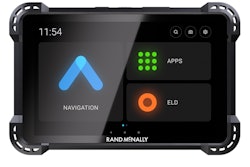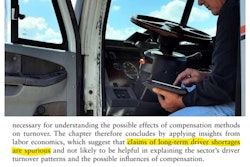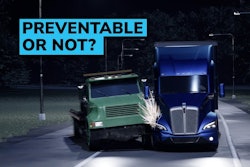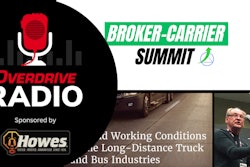FMCSA Office of Registration Director Ken Riddle addressed the Broker-Carrier Summit conference in Texas on Thursday, October 24, to talk fraud prevention through federal registration modernization. He took live questions from one of his "worst critics," too, underscoring just how seriously agency top DOT brass are taking the freight fraud problem.
Riddle first presented on the Unified Registration System modernization efforts, which he detailed days prior at FMCSA's stakeholder day. To get a full, detailed account of what's changing in new registrations, and what existing FMCSA-regulated entities should expect in terms of audits, read here.
To recap some of the more important parts, FMCSA is implementing a new ID verification step that includes a facial scan and photo-ID upload. The agency's already begun denying authorities to companies registered a bad Principal Place of Business address (PPOB), and will soon implement further business verification tools and audit the registrations of existing entities in the system, all 800,000 or so.
FMCSA requires applicants to list a valid PPOB where safety records and other important documents are available for view and audit by FMCSA personnel, but it hasn't aggressively enforced that requirement at the point of registration. Bad actors among carrier entities, hence, have seemed to prefer posting a fake or invalid address like a P.O. Box, a virtual office or other location that keeps their actual location out of the public eye.
[Related: FMCSA's confusing excuse for not enforcing its own rules]
"Not every P.O. box or Staples store PPOB is a criminal," said freight fraud vigilante Dale Prax, who joined Riddle for a Q&A onstage. "But almost every criminal uses a P.O. Box."
The real news of the event came from that Q&A session, where Riddle took questions from the crowd at the summit as well as Prax and MyCarrierPortal Lead Sales Representative Danielle Spinelli.
"Anyone who knows me or follows me on LinkedIn knows I'm probably the worst critic of FMCSA, but I'm also their biggest supporter" when they make positive changes, Prax said. Prax's LinkedIn commentary and in-person advocacy have held FMCSA's feet to the fire over more than a year now in the midst of a growing "fraud apocalypse" in brokered-freight networks.
[Related: The criminal element lurking in FMCSA's outdated registration system]
In April of 2023, Prax point out about 600 brokers and carriers registered with FMCSA using the email address "[email protected]," an apparent act of adding insult to injury as they also largely lacked valid PPOBs, sharing the same residential address. Prax kept hammering on that point, and in March of this year, confronted FMCSA's Riddle in person with a stack of 1,200 approved registrations lacking valid PPOBs.
Riddle, in charge of registrations at the agency, to his credit didn't back down from the challenge. As noted earlier, FMCSA now has begun rejecting applications with bad PPOBs, much to the delight of Prax and other industry watchers.
When Prax first confronted Riddle with the registration lapse, "there were 50 people a week" registering with bad addresses, he said. "That's 200 a month. Last week, there was just one, and that was a brand-new post office that was just built," which would explain why FMCSA didn't flag the address as invalid.
Prax summarized FMCSA's problem this way: "Information comes from the Senate and Congress down, but not enough from industry on the way up." The session at BCS, as well as the three stakeholder-day sessions about registration modernization and reform that preceded it, sought to correct that.
One of Prax's first questions to Riddle addressed the fraud and "carrier vetting" elephants in the room, first with an observation about the other side of that coin, namely broker vetting.
"Less than 1/10th of one percent of carriers don't have contact information [on file] with the FMCSA," said Prax. But on the broker side, 6,746 of some 21,000 or so entities don’t have email contact information registered with FMCSA, while 6,379 brokers don't even have a contact name within the system, according to data Prax's vetting platform FreightValidate has compiled.
How can a carrier adequately vet these brokers? Prax asked. How can FMCSA contact them to make sure they're properly safe and compliant? Small carriers and independent owner-operators, faced with "carrier vetting" services that flag any missing info to brokers, see much better compliance rates, according to Prax's analysis of the data. Among them, just 2,413 -- or .082% of 292,000 entities -- have no contact or phone number registered. Slightly more than 8,000 carriers (2.83%) don't have an email registered.
"Vetting companies concentrate so much on carriers," said Prax. "It may be a secret or it may not be, but there are bad brokers, too."
[Related: Inside the broker-carrier scrum at last week's summit]
Riddle isn't going to bash brokers -- or carriers, for that matter -- and had to stress a few times during the Q&A that FMCSA isn't an enforcement body that can prosecute such lapses. But he took Prax's point. "Part of our modernization effort is to fix that contact information you talked about," he said. "That's all I can say for now."
Indeed it's old news that all FMCSA-regulated entities face registration audits in the coming months, and those that either fail to respond, or do respond and fail the ID verification, "will get a revocation notice," Riddle said.
Riddle also addressed brokers' recent "carrier vetting" obsession head-on, saying brokers might require a year of authority or a number of inspections of a carrier they're doing business with "for good reason, because of all the fraud and bad actors out there," but that ultimately he hopes the modernization effort will "close that gap a little bit... Maybe there will be more trust between brokers and carriers because they can trust the information they're seeing once we've taken enough steps to weed out the bad actors."
In a related question, Riddle was asked directly if FMCSA can intervene when brokers post fraudulent FreightGuard reports on Carrier411. Riddle, essentially, said no, that's outside the agency's authority. If brokers are "just doing bad business practices," FMCSA can't really respond, unless they're brokering loads without authority.
As for who is the cop on the block with bad actors in freight, Riddle referred all complainants to the FMCSA's own National Consumer Complaint Database (NCCDB). He admitted, however, there were "a lot of complaints" there, and no real timeline on getting any single one resolved. (Last year, the NCCDB was the subject of a Government Accountability Office report that suggest it, too, was well in need of a healthy dose of technical and process modernization, like FMCSA's registration system.)
Reports to the NCCDB do, however, help the agency "see trends" in fraud, Riddle said, and allows investigators to later "go through the database to pick out items to analyze and scrutinize. If a broker or carrier catches a bad guy, absolutely report it."
Prax also asked Riddle a few questions about bigger changes the industry might like to see to tamp down the fraud problems. Prax has long advocated that carriers all get their Transportation Worker Identification Credential, a process conducted through the Transportation Security Administration that requires fingerprints and would be very hard for fraudsters to accomplish.
FMCSA sometimes stresses its safety mission by saying safety is our middle name. Prax posited to Riddle that perhaps the TSA, itself a DOT organ, might step up to credential carriers and eliminate fraud, as "security is their middle name."
"I don't disagree," said Riddle, who's recently re-emphasized fraud-fighting efforts as safety efforts themselves, given a carrier ripped off repeatedly by double brokers or stiffed by other bad actors may find skimping on maintenance, tires, brakes and the like a virtual necessity.
More from the Broker-Carrier Summit:
**Inside the broker-carrier scrum at last week's summit
**How to beat brokers at their own game and win direct freight











